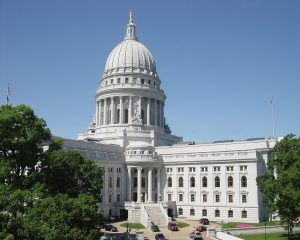Risky Precedents: A Brief Overview of the 2018 Wisconsin Lame Duck Laws & the Separation of Powers Doctrine
 On December 14, 2018, outgoing Wisconsin Governor Scott Walker signed into law three bills that were rapidly passed by the Republican-held state legislature during an extraordinary session following the November 7, 2018 election that resulted in Democrats winning each statewide elected seat. Along with serving various other goals of the Republican legislative majority, the trio of so-called “lame duck” laws were designed to curb the powers of incoming Governor Tony Evers’ administration before he took office in the following ways:
On December 14, 2018, outgoing Wisconsin Governor Scott Walker signed into law three bills that were rapidly passed by the Republican-held state legislature during an extraordinary session following the November 7, 2018 election that resulted in Democrats winning each statewide elected seat. Along with serving various other goals of the Republican legislative majority, the trio of so-called “lame duck” laws were designed to curb the powers of incoming Governor Tony Evers’ administration before he took office in the following ways:
- Transfer control over leadership appointments to the Wisconsin Economic Development Corporation (“WEDC”) from the executive branch to the legislature until September 2019. Then-candidate Evers campaigned on disbanding the WEDC.
- Grant the legislature power to intervene in lawsuits in circumvention of the Wisconsin Attorney General’s office when state statutes are challenged. This provision of the law provides for the use of taxpayer dollars to pay private lawyers to defend the interests of the Republican legislative majority.
- Give the legislature the ability to sign off on and decide how to spend court settlements – a power traditionally held by the Attorney General’s Office.
- Provide the legislature the power to permanently block any regulations written by the state’s numerous administrative agencies, which are part of the executive branch.
- Require the executive branch to get permission from the legislature to make any policy changes within the state’s health care and public benefit programs.
Since December 14, 2018, several lawsuits have been filed raising various legal challenges to the measures imposed by the lame duck legislation. One of the primary legal challenges to the lame duck legislation is constitutional in nature – i.e., that much of the new legislation’s limiting effects on the executive branch violate the principle of separation of powers embodied in the Wisconsin Constitution.

 States and municipalities have increasingly relied on fines and forfeitures as a means to raise revenue, and the ability of law enforcement to impose fines and forfeitures for various criminal and civil offenses has largely gone unchecked by the federal government until recently. The United States Supreme Court’s February 20, 2019 decision in
States and municipalities have increasingly relied on fines and forfeitures as a means to raise revenue, and the ability of law enforcement to impose fines and forfeitures for various criminal and civil offenses has largely gone unchecked by the federal government until recently. The United States Supreme Court’s February 20, 2019 decision in 